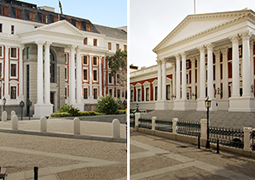
The South African Constitution attaches no special privilege to any member of either the executive, the judiciary or the legislature. They are all subjected to it in equal measure. That is why South Africa is often referred to as a constitutional democracy. The Constitution reigns supreme above anyone and everything else. It is a blueprint of the South African law-making processes, it influences how such laws should be enforced and how the executive implements legislation. But it is Parliament that is charged with the task of conducting oversight to ensure that other organs of the state are accountable to our Constitution.
As a result, the President and the Deputy President are often required to appear before Parliament to give account to matters arising from issues related to their implementation of national legislation. This is in accordance with Section 92 of our Constitution. Section 92 of the Constitution (Sub Sections 1, 2 and 3) stipulate that the Members of the Cabinet are accountable collectively and individually to Parliament for the exercise of their powers and the performance of their functions.
It further states that this is to ensure that they act in accordance with the Constitution and provide Parliament with full and regular reports concerning matters under their control. To achieve this mandate, Parliament has come up with various mechanisms such as debates and question times to hold the executive accountable to its executive authority of implementing national legislation.
When the President and Deputy President appear before the House, they do so during question times or during debates.
According to Rule 210 of the National Assembly, the President must at least once every quarter appear before the National Assembly to answer questions arising from his executive authority or the implementation of legislation by the executive members of his Cabinet. There are only six questions of national and international importance that can be put to the President during question time.
Whenever the President appears before the National Assembly during question time, he or she does so to give effect to this rule. But most importantly, this is one of the mechanisms that Parliament utilises to give effect to its oversight mandate over the President and Cabinet Members. Question time is not only limited to the President, according to Rule 210 of the National Assembly, the Deputy President, as a Leader of Government Business, is also required to appear before the House to answer, among other things, questions related to the passage of Bills or matters of political nature.
As the Leader of Government Business, the Deputy President’s question time seeks to certify that Cabinet Ministers comply with parliamentary rules and what is expected of them as members of the Executive Authority.
According to committee rules, if a committee is not happy with the attendance or conduct of a designated Minister, the said Minister can be reported to the Leader of Government Business to ensure that he or she complies with the mandate of the committee that flows from our Constitution.
Section 92 of the Constitution and question time of Rule 210 of the National Assembly are at the heart of our constitutional democracy and its culture of accountability. Of all, the question time has proven to be the most effective mechanism of accountability and through it South African citizens get to see Parliament’s oversight mandate in action. Symbolically, it has also given effect to the supremacy of our Constitution over every South African citizen, irrespective of his or her status. Most of all, it has restored the powers vested by our Constitution in our Parliament as a custodian of our parliamentary democracy.
Appearance of the President and his Deputy before the National Council of Provinces (NCOP) to answer questions or for national address to the NCOP, is determined by the programming committee of the NCOP. The NCOP usually uses its flagship “Taking Parliament to the People” programme for the President and his Deputy to address the NCOP.
President Cyril Ramaphosa will appear before the National Assembly tomorrow (8 May 2018) for his second oral question and answer session since Parliament elected him as President of the Republic of South Africa in February. His first oral questions session, as President, was on 14 March. Holding regular question and answer sessions is one way in which Parliament holds the President and the Executive to account. Questions for oral reply to the President are scheduled for a question day at least once a quarter during session time within Parliament’s annual programme. Up to six questions about matters of national or international importance may be asked during the three-hour session. The three hours allotted cover the main questions and associated supplementary questions. The six questions scheduled for tomorrow’s plenary sitting cover a range of matters, including President Ramaphosa’s appointment in April of four Special Envoys on Investment and the government’s Investment Conference scheduled for September 2018; reduction of barriers to small businesses and whether he will establish a commission of inquiry into alleged serious dysfunction, malfeasance, corruption and gross abuse of state resources in the Crime Intelligence Division of the South African Police Service and the State Security Agency.

